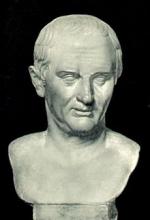|
This section contains 1,628 words (approx. 6 pages at 300 words per page) |

|
The Roman orator and statesman Marcus Tullius Cicero, of Arpinum, had a lifelong interest in philosophy and wrote a number of philosophical works during periods of forced retirement from public life. He was well ac-quainted with the four main Greek schools of his time and counted among his friends and teachers the Epicureans Phaedrus and Zeno, the Stoic Posidonius, the Peripatetic Staseas, the Academics Philo and Antiochus, and many others. He identified himself primarily with the Academy, though he found much to admire also in the Stoa and Lyceum. He rejected Epicureanism.
In a famous passage in a letter to Atticus (xii, 52, May 21, 45 BCE), with reference to some of his books on philosophy, Cicero calls them copies ("apographa"), written with little effort; he supplied only the words ("Verba tantum adfero, quibus abundo"). A week earlier he had written: "It is...
|
This section contains 1,628 words (approx. 6 pages at 300 words per page) |

|


